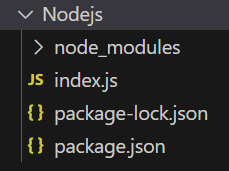Express express.Router() Function
Last Updated :
01 Jan, 2024
The express.Router() function is used to create a new router object. This function is used when you want to create a new router object in your program to handle requests.
Syntax:
express.Router( [options] )
Optional Parameters:
- case-sensitive: This enables case sensitivity.
- mergeParams: It preserves the req.params values from the parent router.
- strict: This enables strict routing.
Return Value: This function returns the New Router Object.
Steps to Install the express module:
Step 1: You can install this package by using this command.
npm install express
Step 2: After installing the express module, you can check your express version in the command prompt using the command.
npm version express
Step 3: After that, you can just create a folder and add a file, for example, index.js. To run this file you need to run the following command.
node index.js
Project Structure:

Project Structure
The updated dependencies in package.json file will look like:
"dependencies": {
"express": "^4.18.2",
}
Example 1: Below is the code of express.Router() Function implementation.
javascript
const express = require('express');
const app = express();
const PORT = 3000;
const router = express.Router();
router.get('/', function (req, res, next) {
console.log("Router Working");
res.end();
})
app.use(router);
app.listen(PORT, function (err) {
if (err) console.log(err);
console.log("Server listening on PORT", PORT);
});
|
Steps to run the program: Run the index.js file using the below command:
node index.js
Output:
Console Output:
Server listening on PORT 3000
Browser Output:
Now open your browser and go to http://localhost:3000/, you will see the following output on your screen:
Server listening on PORT 3000
Router Working
Example 2: Below is the another code example of express.Router() Function implementation.
javascript
const express = require('express');
const app = express();
const PORT = 3000;
const router1 = express.Router();
const router2 = express.Router();
const router3 = express.Router();
router1.get('/user', function (req, res, next) {
console.log("User Router Working");
res.end();
});
router2.get('/admin', function (req, res, next) {
console.log("Admin Router Working");
res.end();
});
router3.get('/student', function (req, res, next) {
console.log("Student Router Working");
res.end();
});
app.use(router1);
app.use(router2);
app.use(router3);
app.listen(PORT, function (err) {
if (err) console.log(err);
console.log("Server listening on PORT", PORT);
});
|
Steps to run the program: Run the index.js file using the below command:
node index.js
Now make a GET request to http://localhost:3000/user, http://localhost:3000/admin, and http://localhost:3000/student, then you will see the following output on your console:
Output:
Server listening on PORT 3000
User Router Working
Admin Router Working
Student Router Working
Share your thoughts in the comments
Please Login to comment...